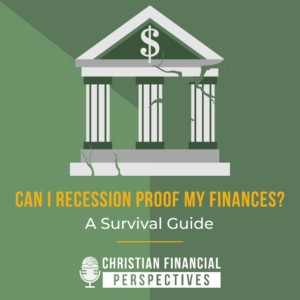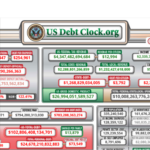Click below to listen to Episode 175 – Can I Recession-Proof my Finances?
Subscribe: Apple Podcasts | Google Podcasts | Spotify | Amazon Music | Stitcher | RSS | More
Can I Recession-Proof my Finances?

Learn how to get a better handle financially and emotionally when it comes to a recession.

“Recession” is a word constantly looming in many Americans’ minds, and it is a common topic among news outlets. But, what if you could prepare financially for a recession? Bob and Shawn discuss the ongoing predictions of an economic recession in the financial markets. They emphasize the inevitability of economic cycles with periods of boom and bust.
Through insight from various scriptures, they encourage diversifying investments across different sectors of the economy, saving during prosperous times, and avoiding excessive debt. Economic cycles are a natural part of life, so preparing for them should be a natural part of financial planning as well.
HOSTED BY: Bob Barber, CWS®, CKA®
CO-HOST: Shawn Peters
Mentioned In This Episode
Bible Verses In This Episode
ECCLESIASTES 11:2
Invest in seven ventures, yes, in eight; you do not know what disaster may come upon the land.
GENESIS 41
Joseph interprets Pharoah’s dream of 7 good years and 7 bad years of harvest and famine.
PROVERBS 6:6-11
Go to the ant, you sluggard; consider its ways and be wise! It has no commander, no overseer or ruler, yet it stores its provisions in summer and gathers its food at harvest. How long will you lie there, you sluggard? When will you get up from your sleep? A little sleep, a little slumber, a little folding of the hands to rest— and poverty will come on you like a thief and scarcity like an armed man.
PROVERBS 22:7
The rich rule over the poor, and the borrower is slave to the lender.
Want to ask a question about your specific situation? Schedule a complimentary 15 minute phone call.
EPISODE TRANSCRIPT
Shawn:
Is a recession looming? With $33 trillion in national debt, what does the Bible teach us about weathering financial storms? Tune in for faith-driven financial strategies. Let’s get some perspective.
Welcome to another episode of Christian Financial Perspectives. We’re so glad that you’ve joined us today. Whether you’re watching or listening, my name is Shawn Peters and I’m joined as always by my esteemed father-in-law and co-host Bob Barber. Today we’re going to be covering a topic that we believe would be very beneficial to those of you out there – wisely preparing for economic recessions. So today we do have a lot to cover, but we are going to save the scriptures that we have for more towards the end, which will make sense. But Bob, you want to give us a little more of an intro on here?
Bob:
I sure will, Shawn. As you know for about the last year to year and a half, the markets have been predicting, when I say the markets, the stock markets, the equity markets, all the financial markets have been predicting that we’re going to go into this economic recession, especially as the Fed has been raising rates.
Shawn:
Okay.
Bob:
Well, it’s interesting because this has not happened yet.
Shawn:
So for over a year we’ve been hearing the predictions of, “We’re going to have a recession. We’re going to have a recession.” So will it happen? Maybe. Maybe not, but we have some things to cover in relation to that. So I would say the first one, there will always be economic booms and busts. Always. It’s just a natural part of economic cycles and preparing for recessions is wise.
Bob:
It’s like the balloon. You can only blow the balloon up so much before there it’s going to pop.
Shawn:
Or the rubber band.
Bob:
It’s natural. The rubber band, you can only stretch it.
Shawn:
You can stretch it. You can only stretch it so far before it either snaps back or snaps.
Bob:
And recessions can be short-lived. Some can be long. The one that we had a few years ago was very short because the government came in and stimulated the economy so much by adding $7-9 trillion of money into the economy and now we’ve got to pay that back, by the way.
Shawn:
I still can’t wrap my head around. I mean $7-9 trillion.
Bob:
A trillion has 12 zeros in it.
Shawn:
Yeah, it’s a lot. It’s a big number.
Bob:
Recessions will always come and go. Some will be short, some will be long, as the famous Great Depression of the 1930s lasted many, many years. I hope we never had that happen again. The one thing that’s different about now versus then is we’re a very diversified economy where back then it was very driven by farming and just industrial, where now there’s all the different sectors that are driving the economy. But the one thing I want to say, Shawn, is the government’s not always going to be able to bail us out.
Shawn:
That’s true. Yeah. Well, as a good example too when Germany, I believe it was after World War I, that they were having serious issues with their currency and they just tried to print more and more money because of the war debts and everything else that they had. And it got to the point that it was more efficient and cost less money to burn German currency to keep warm than it was to actually buy firewood. So there is a point that if we’re not careful for any country, that there is no way for the country to bail itself out, especially not with printing money. You have to actually make some changes.
Bob:
You do, Shawn. The interesting thing though is for the last 90 years, the government bailed us out of the Great Depression. It was with wartime and they started printing money at that point.
Shawn:
Well, also what helped a lot with that Bob, is from the Depression and then going into World War II, is that the industries all kicking into high gear to support the war effort. It wasn’t just about the printing money, but it was something actually happening.
Bob:
Who was paying for that?
Shawn:
Yes, I know the government’s paying for it, but unlike the German example I was saying is that at least there was some sort, there was a lot in the private sector that was actually generating jobs and work and product. So it wasn’t just printing money, but again, the printing money didn’t help either.
Bob:
Yeah.
Shawn:
In the long run.
Bob:
So right now, and you can go to USdebtclock.org and you can see all this, but our country is heading to a debt of 33 trillion. You hear that 33 trillion and Shawn, that’s 50% higher than it was just four years ago. So it took us 80, 90 years to get to the $20 trillion debt. And then in just the last three years, we’ve gone 50% higher and it was all the stimulus checks that Covid, from Covid, that caused this. And there’s a lot of Trump fans, and I’m not going to try to get political here, but 7 trillion of that was from him. Okay.
Shawn:
It’s almost like our government does this kind of regardless of the political party.
Bob:
It seems that way.
Shawn:
Again, not trying to point fingers either way, but it’s just our government as a whole, doesn’t matter what party it is, has a bad habit of continuing to just spend money it doesn’t have.
Bob:
And every time we print more money, every single time, it devalues it. And that’s why we’ve had such so much inflation. Last year we had inflation at 9% and 10%. And it’s interesting now as the government, as the Fed starts raising rates and tightening things back, it pulls inflation back down. But there was all this free money. As you know, two years ago, you had no advantage of being a cash buyer over a borrowing buyer for real estate. So it caused real estate to go through the roof.
Shawn:
The prices of real estate.
Bob:
So 33 trillion, okay. Remember a trillion has 12 zeros behind it. Alright? If you divide that and I looked at the population of the United States, now it’s about 332 million. So I get my calculator out and I divide it, and that is right at nearly a hundred thousand. It’s actually $99,397 of debt for every man, woman and child.
Shawn:
Not household, every man, woman, and child, based on the latest population estimates were 332 million. So wow. So for my household, there’s Jenna and I and our two kids.
Bob:
Right. So you’re about $400,000.
Shawn:
Our share as a family is $400,000.
Bob:
Yes. Yes, exactly. Now countries rise and they fall on debt. The Roman Empire is a very, very good example too of when a government gets too large and out of control and it always eventually falls. Listen, I want to say I cannot, and I will not predict this, okay? I’m not saying that we’re going to fall off a cliff tomorrow. I’m not saying we’re going to fall off a cliff in 20 years. I am not going to predict when this is going to happen. But you know me, my favorite saying…
Shawn:
It’s just math.
Bob:
It’s just math.
Shawn:
And in this case, math doesn’t lie. So this is less of a, we’re trying to scare you. And then so you have some ad about buying gold or coins or whatever afterwards that this is more of just trying to give some sort of realistic expectation of this is the way stuff works. But again, not a prediction on this is going to happen next year or something like that.
Bob:
Not at all. And we’re going to get into some scriptures pretty deep here in a minute. Normally we start off at the beginning with scripture, but we’re going to end up the program today. We’re going to spend some good amount of time with scripture, because scripture gives us examples of how to prepare for recessions. And you should never just go stick your head in the sand and say it’s not going to happen. But governments, they get less and less efficient the larger they get. That’s right. Our forefathers were geniuses, but I wonder if they ever realized we’re going to be 332 million people.
Shawn:
Well, and spanning how many thousands of miles across?
Bob:
The US huge. We were 13 back
Shawn:
Then. Yeah, 13 colonies just kind of over on the east coast and now compared to the size of the country then, it’s huge.
Bob:
And over taxation. And the government’s attempt to equalize everyone. It never works in the long run because you know what the wealthy will do? They’ll find a way not to be taxed at higher rates or they’ll leave. They’ll just leave. And politicians that say the wealthy don’t pay their fair share, they’re just liars. Okay? All you got to do is go look at a tax table, just pull up IRS tax table and you’ll see that the more you make the larger percentage you have to pay. And we have people in our country paying 35% and 40% with state tax paying him 50%.
Shawn:
Bob. I have a really interesting example. I’d like to cover that. So Warren Buffett, it wasn’t that long ago that he had said it was like an interview and he was talking about how he pays less taxes than his assistant, his secretary, whatever position was. And while technically you could say that was true, the problem was even for him to say that knowing full well what he was saying was incredibly misleading. And in my opinion, when you say things in a way specifically to mislead people, that’s the same thing as lying to him. And the reality is that people who actually work and make an income, I think like doctors and lawyers and people who make arguably a very large income, the problem is they’re making a normal income where they work and got paid and they pay income tax off of it. But when you talk about this really, really wealthy families who are able to, oh, they just sell some of their stock positions or things like that and they’re only paying capital gains, okay, sure. Technically their overall taxable rate isn’t as high. But again, when they sell those stocks, it’s not like they didn’t work. They took a risk by having that money invested. There’s a reason why we have the income tax rate and the capital gains rate. But in either case, the idea of like, oh, the wealthy aren’t paying their fair share is still ludicrous as a whole because the vast majority of Americans pay not just percentage wise, but dollar amount wise, pay way more than the rest of us.
Bob:
And Shawn…
Shawn:
So anyway, rant over.
Bob:
Boy, you did, didn’t you?
Shawn:
I’m just frustrated hearing that. It’s such a lie that politicians use to basically trick a bunch of us that aren’t in the 40-50% tax bracket,
Bob:
But even you have long-term capital gains with the 20% plus an additional what they call the Obama care tax, you’ll be at 24-25%.
Shawn:
And what that doesn’t take into account, unlike with income tax over time and the amount you pay, the tax rate…
Bob:
We have to go on.
Shawn:
Okay, I know, but I just want to make sure that people hear this point and stop repeating that stupid lie about the wealthy don’t pay their fair share. The capital gains tax is lower, but it doesn’t take into account inflation. So the purchasing power change. So when you hear about these changes to capital gains on how people should pay money on investments, even if they didn’t sell anything, it’s even more ludicrous. We need to do another episode on that. I’m frustrated. Let’s go.
Bob:
I could tell. I could tell. Okay. Here’s the one thing, though. I want you to understand when we talk about preparing for economic recessions, that they’re always going to come along and there’s going to be good times and bad times because scripture tells us. We’ve shared this scripture many times, “There’s a time for everything.” There’s going to be good times and bad times. And some of the scriptural examples I think are great to apply for recessions would be, the first one would be Ecclesiastes 11:2, which we mention around here a lot is, “Invest in seven ventures. Yes, in eight, you do not know what disaster may come upon the land.”
Shawn:
I mean, I can’t think of a better scripture that directly talks about preparing for recessions, whether it’s minor or major.
Bob:
So we’re talking about all the different sectors. There’s 11 to 12 different sectors of the economy and everything from utilities to energy to technology…
Shawn:
Healthcare, real estate,
Bob:
Yeah, you name it, they’re all listed. So that’s what this means is you don’t go put all your money in one basket. It’s like mom always said, don’t put all your eggs in one basket. That’s right. Okay.
Shawn:
So in mathematical terms with seven to eight, you’re looking at somewhere around 12.5 to 14.3%. Don’t put any more than that in any one particular sector, especially when you hear the news talking about how oh, technology is up 70%. Well first of all, you missed the opportunity to move into it.
Bob:
What’s this already up 70?
Shawn:
But also definitely don’t put any more than say 12.5% to 14.3% in there because you’re going to be way overweighted and not properly diversified.
Bob:
So I have these listed again, technology, real estate, healthcare, energy, consumer staples, materials, and the list goes on. And people have a hard time with this though. I was just talking with Don here in our office this morning and he’s talking with the business owner and the business owner has everything invested in his one business and he has very little outside of that.
Shawn:
Which is dangerous.
Bob:
It’s very dangerous. Exactly.
Shawn:
Don’s one of our advisors.
Bob:
Alright, now the other scriptural principle that we’re going to spend some time on, but it’s a whole chapter so we’re not going to read the whole chapter.
Shawn:
Genesis 41.
Bob:
Genesis 41. And it gives us an example in here where Pharaoh has a dream and he has Joseph, not the Joseph in the New Testament, the Joseph in the Old Testament, the one that the brothers all…
Shawn:
The one with the bright colors, uh coat.
Bob:
They threw him in the hole and then he came out and pretty much helped run, not ruin, but run each later. But he had him interpret the dream and this dream he was seeing these seven fat cows and then he was seeing seven lean cows.
Shawn:
They were like famished.
Bob:
Pharoah’s like, what does this mean? And he said, you’re going to have seven good years.
Shawn:
Of plenty.
Bob:
And then you’re going to have seven bad years. He says, okay, so what should we do? And he says, take a fifth of the harvest.
Shawn:
Or 20% for those of you who don’t remember your fractions.
Bob:
Right. So lett’s take 20% of the harvest during the good years and save it up.
Shawn:
For the bad years.
Bob:
That’s preparing.
Shawn:
To basically help get you through it.
Bob:
Am I not saying right there that is a scriptural principle right there.
Shawn:
I believe that emphasis is in…
Bob:
Preparing for economic recessions
Shawn:
Verse 34 through 36. So if you’re wanting to look at it.
Bob:
Okay, yeah.
Shawn:
And the other part that’s amazing with this Bob, is that that preparation was not just Egypt, but many of the countries surrounding it, including the land of Canaan or whatever it’s called at the time. Joseph’s family, when they came to Egypt, Egypt was basically the only place in the area that wasn’t dying off from the famine. And so had it not been for the position that Egypt was in and that God had over time gotten Joseph exactly where he needed to be, it wouldn’t have just been Egypt, but the entire area over there in the Middle East might have died off. I mean, we don’t know what would happen. But the point was God took care of both Egypt and the surrounding countries from having Joseph at the right place.
Bob:
And I believe that this is in the Bible to give us a scriptural example how to prepare for recessions. We’ve got the Ecclesiastes, give your portions of seven or eight. We’ve got Genesis 41 that talks about preparing and saving during the good years, not living like…there’s people you’ll see in the good times, you just spend, spend, spend and they live like there’s no tomorrow and that’s not wise. And then we go over, right over to Proverbs, it talks about the ant. And we’ve mentioned this many times. We don’t have to read the whole thing today, but he talks about, “You sluggard.”
Shawn:
That’s right. So consider the ant and don’t just sit around and just think, oh yeah, that’s fine. We don’t need to prepare or anything because scarcity and poverty will come on you.
Bob:
Like a bandit.
Shawn:
I’m paraphrasing.
Bob:
Yeah. But it says it was saving in the summertime for the wintertime. Alright. Because think of wintertime and economics like an economic winter.
Shawn:
Exactly. Or a recession.
Bob:
And then debt is the same way. Don’t get yourself in a lot of debt. Proverbs 22:7, and we read this many times on Christian financial perspectives. You become a slave to the lender when you have more debt than you can handle.
Shawn:
Specifically, “The rich will rule over the poor, and the borrower is slave to the lender.”
Bob:
So God has given us in his word how to prepare for recessions. It’s all laid out right there.
Shawn:
So Bob, what do we do with all this information?
Bob:
You take this information and you put it in financial planning and you diversify your portfolio, you build cash reserves up to that amount. And by the way, if you’re saying what does that amount, 20% times seven. 2×7=1.4, that’s 1.4 years. I know that’s a long time to think of cash reserves. Most people were thinking in six month realms or even three months if they can get there. But the point of this is during the good times to be saving up for the bad times because they will always happen. God’s word says it will happen and God’s word is always true.
Shawn:
But the good news about that too, it says in Ecclesiastes that there’s a time for everything. That’s also not something to be scared of. Because just like we know there will be bad times in the bad times, we know there will be good times again.
Bob:
And God does not want us to live in a spirit of fear. That is not of God. Okay? So be wise and plan, plan, plan. And we’ll help you with all these variables so you’ll be ready for any minor or major significant economic recessions because they’re going to happen and when the next one’s going to happen. I’m not going to predict, I don’t predict things like that, but I do believe it’s wise to always be prepared, and we can advise you using proven long-term biblical principles. They’re in the Bible. The Bible has so much to say about finances. We know it’s 1500 to 2000 scriptures is what biblical scholars say. Alright. You want to talk more about this? You want to prepare for the next recession, you want to handle things from a Biblical perspective with your finances? Give us a call, we can be reached at (830) 609-6986. You can call that or text that during business hours. Or you can go to our website www.christianfinancialadvisors.com. And Shawn, any last words?
Shawn:
No, I think we covered it. And apologies everybody on my rant earlier, we’ll do another episode on that, so I can get it all out there. But thank you so much for joining us. God bless, and we’d love to hear from you. So send us an email, text, comment down below if you’re on the video. And other than that, God bless you. Thanks for joining us.
[DISCLOSURES]
* Investment advisory services offered through Christian Investment Advisors Inc dba Christian Financial Advisors, a registered investment advisor registered with the SEC. Registration as an investment advisor does not imply a certain level of skill or training. Comments from today’s show are for informational purposes only and not to be considered investment advice or recommendations to buy or sell any company that may have been mentioned or discussed. The opinions expressed are solely those of the hosts, Bob Barber and Shawn Peters, and their guests. Bob and Shawn do not provide tax advice and encourage you to seek guidance from a tax professional. While Christian Financial Advisors believes the information to be accurate and reliable, we do not claim or have responsibility for its completeness, accuracy, or reliability.










